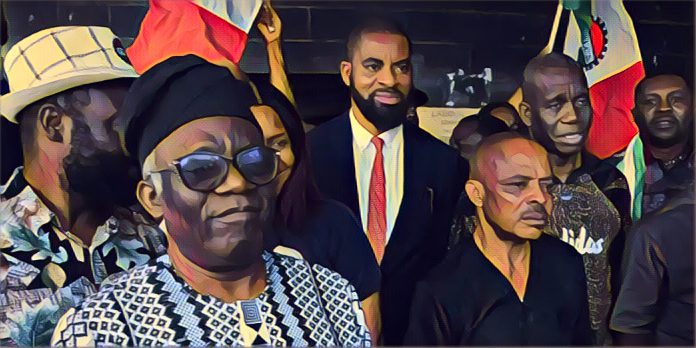Tensions ran high in Abuja recently as a potential clash between police officers and workers was narrowly avoided, thanks to the swift intervention of prominent labor leaders, including Joe Ajaero, and human rights lawyer Femi Falana. The incident unfolded during a protest organized by the Nigeria Labor Congress (NLC) over wage disputes and poor working conditions.
Hundreds of workers had gathered in the Nigerian capital to demand better pay and improved working conditions. The protest, which started peacefully, soon turned tense as police officers were deployed to disperse the demonstrators. According to eyewitnesses, the presence of heavily armed police units escalated the situation, causing anxiety among the protesters.
As the crowd grew restless, tensions threatened to boil over into violence. Sensing the potential for a dangerous confrontation, Ajaero, the President of the NLC, alongside Falana and other labor leaders, quickly moved to de-escalate the situation. They engaged with both the protesters and police officers, urging calm and emphasizing the need for dialogue over confrontation.
“Today, we witnessed what could have been a tragic situation if not for the timely intervention of our leaders,” said one of the protesters. “We came here to make our voices heard, not to fight with the police.”
Falana, a well-known advocate for workers’ rights, addressed the crowd, calling for restraint and assuring them that their grievances would be addressed through proper channels. “We understand your frustrations, but violence is not the answer,” Falana said. “We must remain peaceful and united in our quest for justice and fair treatment.”
Ajaero also spoke to the police officers, emphasizing that the workers were exercising their constitutional right to peaceful assembly. “These workers are not criminals; they are citizens demanding their rights,” he stated. “Let’s ensure this remains peaceful.”
The combined efforts of Ajaero, Falana, and other labor leaders were instrumental in diffusing the tension. They managed to negotiate with the police, allowing the protest to continue without further incident. This intervention not only prevented potential violence but also highlighted the importance of effective communication and negotiation in managing civil unrest.
The protest in Abuja is part of a broader wave of labor unrest in Nigeria, where workers have been increasingly vocal about their dissatisfaction with the government’s handling of wage issues and labor rights. The NLC and other unions have been at the forefront of these protests, advocating for higher wages, improved working conditions, and better protection of workers’ rights.
In recent months, the government has faced mounting pressure to address these concerns, with unions threatening to escalate their protests if no action is taken. The situation in Abuja underscores the delicate balance between maintaining public order and respecting citizens’ rights to protest.
Human rights organizations have praised the role played by Ajaero and Falana in averting a potential crisis, calling it a model for how labor disputes should be handled. “The peaceful resolution of this situation is a testament to the power of dialogue and responsible leadership,” said a spokesperson for a local human rights group.
As the Nigerian government continues to grapple with economic challenges and social unrest, the peaceful outcome of the Abuja protest serves as a reminder of the importance of listening to citizens’ voices and addressing their concerns through constructive engagement.
Moving forward, there is hope that the government will take meaningful steps to address the grievances of Nigerian workers and ensure fair treatment for all. The events in Abuja demonstrate that peaceful protest and dialogue remain powerful tools for effecting change.
Source: Business Day



